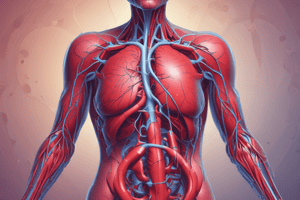Podcast
Questions and Answers
What is the most severe complication of aneurysms?
What is the most severe complication of aneurysms?
- Hypovolemic shock due to hemorrhage (correct)
- Connective tissue disorders
- Hypertension
- Infection
What is the primary characteristic that distinguishes a saccular aneurysm from a fusiform aneurysm?
What is the primary characteristic that distinguishes a saccular aneurysm from a fusiform aneurysm?
- Dilation affecting the entire circumference of the artery
- Separation of the layers of the artery
- Presence of blood leaks into the artery wall
- Outpouching of only a specific portion of the artery (correct)
What is the initial intervention for a suspected ruptured aneurysm?
What is the initial intervention for a suspected ruptured aneurysm?
- Large bore IV (correct)
- Electrocardiogram (ECG)
- Chest X-ray
- Routine blood work
Which of the following is a modifiable risk factor for aneurysms?
Which of the following is a modifiable risk factor for aneurysms?
Which of the following is NOT a sign or symptom of ruptured aneurysm?
Which of the following is NOT a sign or symptom of ruptured aneurysm?
What diagnostic imaging method is typically used for visualizing an aneurysm with contrast?
What diagnostic imaging method is typically used for visualizing an aneurysm with contrast?
Which part of the body is most likely to experience pain in the presence of an abdominal aortic aneurysm?
Which part of the body is most likely to experience pain in the presence of an abdominal aortic aneurysm?
How should hypertension be managed to prevent rupture of aneurysms?
How should hypertension be managed to prevent rupture of aneurysms?
What imaging technique may be used to confirm Aortic Dissection?
What imaging technique may be used to confirm Aortic Dissection?
What happens in a dissecting aneurysm?
What happens in a dissecting aneurysm?
What is a key component of the Long Term Management for Aortic Dissection?
What is a key component of the Long Term Management for Aortic Dissection?
Which symptom is commonly associated with a brain aneurysm?
Which symptom is commonly associated with a brain aneurysm?




